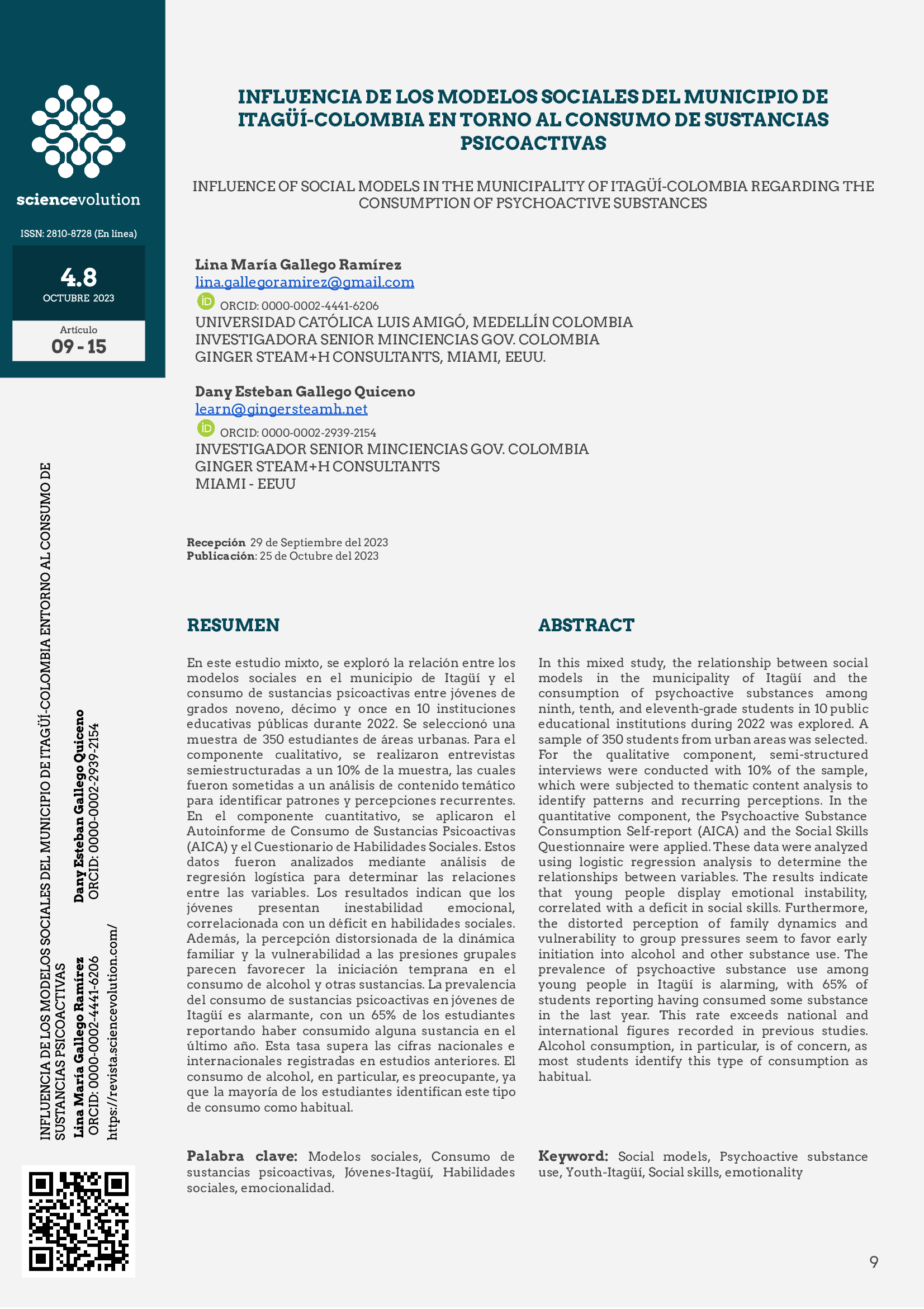Abstract
In this mixed study, the relationship between social models in the municipality of Itagüí and the consumption of psychoactive substances among ninth, tenth, and eleventh-grade students in 10 public educational institutions during 2022 was explored. A sample of 350 students from urban areas was selected. For the qualitative component, semi-structured interviews were conducted with 10% of the sample, which were subjected to thematic content analysis to identify patterns and recurring perceptions. In the quantitative component, the Psychoactive Substance Consumption Self-report (AICA) and the Social Skills Questionnaire were applied. These data were analyzed using logistic regression analysis to determine the relationships between variables. The results indicate that young people display emotional instability, correlated with a deficit in social skills. Furthermore, the distorted perception of family dynamics and vulnerability to group pressures seem to favor early initiation into alcohol and other substance use. The prevalence of psychoactive substance use among young people in Itagüí is alarming, with 65% of students reporting having consumed some substance in the last year. This rate exceeds national and international figures recorded in previous studies. Alcohol consumption, in particular, is of concern, as most students identify this type of consumption as habitual.
References
Braun, V., & Clarke, V. (2006). Using thematic analysis in psychology. Qualitative Research in Psychology, 3(2), 77-101.
Correa de Molina, Cecilia; Rodríguez Molina, Daniella; Gallego Quiceno, Danny y Simancas Trujillo, Ricardo. (2018). La armonía entre la teoría y la práctica: Formación docente. Ediciones Universidad Simón Bolívar. Colombia
Degenhardt, L., Charlson, F., Ferrari, A., Santomauro, D., Erskine, H., Mantilla-Herrara, A., ... & Whiteford, H. (2016). The global burden of disease attributable to alcohol and drug use in 195 countries and territories, 1990–2016: a systematic analysis for the Global Burden of Disease Study 2016. The Lancet Psychiatry, 5(12), 987-1012.
Field, A. (2013). Discovering statistics using IBM SPSS statistics. Sage.
Gallego Quiceno, D. E., Bustamante Penagos, L., Gallego Ramírez, L., Salcedo Diaz, L., Gava, M., & Alfaro Melendez, E. (2017). Estudio cuantitativo sobre las concepciones de ciencia, metodología y enseñanza para profesores en formación. Revista Lasallista de Investigación, 14(1), 144-161.
Gallego Quiceno, D., López, A., Medina, L., Watcher, J., & Ossa, J. (2016). Metodología para la evaluación de las políticas públicas en programas sociales en Medellín. In La fiscalización y el control, nuevas perspectivas (1ra.).Sello editorial Coruniamericana.
Gallego, D. (2013). Las concepciones de ciencia, metodología y enseñanza de los profesores en formación: el caso de la Facultad de Educación de la Universidad de Antioquia (Colombia). Andalucia: Universidad Internacional de Andalucía.
"Gallego, D.; Barragan, A.; Gallego, L.; Corredor, A. & Echeverri, C. (2016).
Intervención Psicopedagógica en adolescentes con tendencias depresivas"" En: Retos y tendencias de la educación para la humanización. (pp. 107-148). Medellín: Sello Editorial Corunimericana."
"Gallego, L.; Corredor, A.; Gallego, D.; Cuellar, O.; Bustamante, L. (2016). Las habilidades sociales y hábitos de estudio de los educandos nuevos"". En: Retos y tendencias de la educación para la humanización. (pp. 31-74). Medellín: Sello Editorial Coruniamericana."
"Gallego, L.; Quiceno, D.; López, A.; Giraldo, L. & Sepúlveda, J. (2017). La influencia de la psicología ambiental en el contexto de la educación en Colombia: el caso del centro de Medellín. Producción+ Limpia, 12(1), 124 - 132 - DOI: 10.22507/pml.v12n1a13"
Gómez, N. S., Valero, E. M., Goyeneche, R. L., Gallego-Quiceno, D. E., & Muñoz, L. Y. (2018). La pedagogía crítica desde la perspectiva de Freire, Giroux, y Mclaren: su pertinencia en el contexto de Colombia y América Latina. Obtenido de Educación. Vol, 39.
Hawkins, J. D., Catalano, R. F., & Miller, J. Y. (1992). Risk and protective factors for alcohol and other drug problems in adolescence and early adulthood: Implications for substance abuse prevention. Psychological Bulletin, 112(1), 64-105.
Hawkins, J. D., Catalano, R. F., & Miller, J. Y. (1992). Risk and protective factors for alcohol and other drug problems in adolescence and early adulthood: Implications for substance abuse prevention. Psychological Bulletin, 112(1), 64-105.
Jessor, R. (1987). Problem-behavior theory, psychosocial development, and adolescent problem drinking. British Journal of Addiction, 82(4), 331-342.
Johnston, L. D., O'Malley, P. M., & Bachman, J. G. (2002). Monitoring the Future national survey results on drug use, 1975-2001. Volume I: Secondary school students (No. 01-5375). National Institute on Drug Abuse.
Kandel, D. (1985). On processes of peer influences in adolescent drug use: A developmental perspective. Advances in Alcohol & Substance Abuse, 4(3-4), 139-163.
Matson, J. L., Rotatori, A. F., & Helsel, W. J. (1983). Development of a rating scale to measure social skills in children: The Matson Evaluation of Social Skills with Youngsters (MESSY). Behaviour Research and Therapy, 21(4), 335-340.
Matson, J. L., Rotatori, A. F., & Helsel, W. J. (1983). Development of a rating scale to measure social skills in children: The Matson Evaluation of Social Skills with Youngsters (MESSY). Behaviour Research and Therapy, 21(4), 335-340.
Medina-Mora, M. E., Real, T., García, J. J., & Galván, J. (2018). Drogas y Cultura en México. Salud mental, 41(3), 127-135.
Ramírez, L. M. G., Quiceno, D. E. G., Gómez, A. C., Rojas, Ó. A. C., & Penagos, L. E. B. (2016). LAS HABILIDADES SOCIALES Y LOS HÁBITOS DE ESTUDIO DE LOS EDUCANDOS NUEVOS DE LA CORPORACIÓN UNIVERSITARIA AMERICANA EN LA SEDE MEDELLÍN. RETOS Y TENDENCIAS DE LA EDUCACIÓN PARA LA HUMANIZACIÓN, 31.
Smith, A., & Jones, J. (2017). The relationship between cannabis use and measures of anxiety and depression in a sample of college campus cannabis users and non-users post state legalization in Colorado. PeerJ, 5, e3890.
Spoth, R., Greenberg, M., & Turrisi, R. (2008). Preventive interventions addressing underage drinking: State of the evidence and steps toward public health impact. Pediatrics, 121(Supplement 4), S311-S336.
Volkow, N. D., Baler, R. D., Compton, W. M., & Weiss, S. R. B. (2014). Adverse health effects of marijuana use. New England Journal of Medicine, 370(23), 2219-2227.

This work is licensed under a Creative Commons Attribution-NonCommercial-NoDerivatives 4.0 International License.
Copyright (c) 2023 http://revista.sciencevolution.com/

